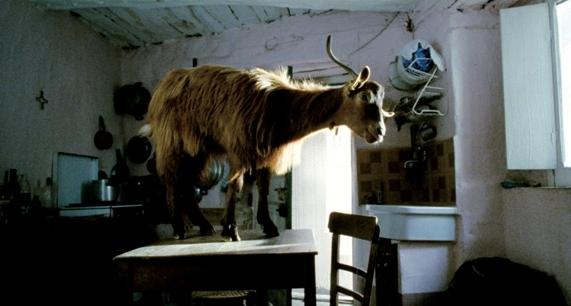Last night Robert De Niro’s Cannes jury awarded the Palme d’Or to Terrence Malick’s The Tree of Life, described by one critic there as “a hymn to the glory of creation”. At last year’s festival another film fitted the same description, only it achieved its ends in a leaner, far quieter fashion; and unlike Malick’s film, Le Quattro Volte can be seen not only as dabbling with the profound, but as being delightfully and accessibly tongue-in-cheek.
Set in and around a Calabrian hill village, it opens on the person whom we imagine is to be the chief protagonist, an elderly shepherd. We follow this grizzled chap as he tends to his herd of goats, sells his dairy wares on the steep streets of the village, and administers his evening “medicine”, literally dust and dirt that has been swept from the local church hall, and offered to him with a blessing, a devoutly misguided antidote to his debilitating cough.
Then, suddenly, this old chap is taken from the story altogether, which then switches – unbelievably, brilliantly – to the animals in his care. And as these glorious goats run amok in a brief moment of freedom, we realise that we’ve been hoodwinked, that what seemed like a worthy fly-on-the-wall documentary of rural life has another dimension entirely.
Indeed, if Le Quattro Volte is a documentary at all, it is in the way that Robert Flaherty’s Nanouk of the North and Man of Arran were documentaries. Flaherty took as his basic material real people, in their natural environments, but juggled the pack and manipulated them for the purposes of his own narrative, and his own “truth”.

Here, Michelangelo Frammartino goes even further, one has to assume, by training his animals – the old man’s sheepdog, at least – to do his bidding. The moment when the director shows his hand is a sequence of Jacques Tati-like genius. He positions his camera opposite the old man’s house, pointed towards the street and the goats’ pen. From here, he pans this way and that, following the action – and principally following the dog, as it chases anyone and anything that comes into the frame, notably a Stations of the Cross procession, until the moment when the hound causes the most fabulous moment of chaos. When Frammartino finally cuts, it is to the goats as they enter and rampage through the old man’s home, one standing atop his kitchen table in a triumphant pose that could not have been better achieved by an actor.
Hereon, Frammartino quickly and economically establishes the theme of his cunning tip-toe between fact and fiction. The old man’s burial segues with the birth of a goat; the kid, separated from its herd in winter, huddles under a fir tree; in spring, the tree is felled, plays a role in a village pole-climbing ritual before being cut up and turned into coal. Thus the film connects man, animal, vegetable and mineral, the seasons, in the cycle of life and death; it becomes a Pythagorean reflection on the harmony of nature, with a casual nod to the transmigration of souls.
But one can choose to embrace the film at this level, or not. It reminds me of Sleep Furiously, Gideon Koppel’s elegiac documentary depicting a year in the life of a Welsh farming community; despite Frammartino’s formal tricksiness and the philosophical underlay, Le Quattro Volte (The Four Times) can be enjoyed in the same way.
There is no voiceover, no soundtrack, only the constant refrain of the goats’ bells. There’s no need for more. The camera is marvellously observant: from the scenes of the solitary old man to the close-ups of the goats’ oddly handsome visages, from the cloud cover creeping over the landscape to the final, meticulous detailing of the earth mound that creates the charcoal, Frammartino creates a complete sense of place. While his film observes its cycles and connections, there is no grandiose posturing, merely affection, understanding, the recognition of a certain pathos, and a great deal of humour. It is a sublime little film.
Watch the trailer to Le Quattro Volte













Add comment